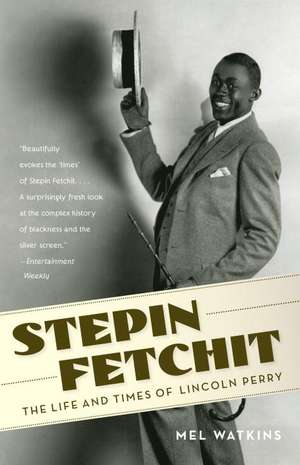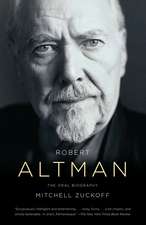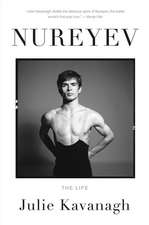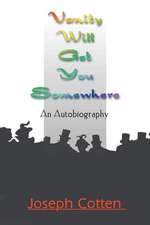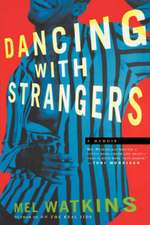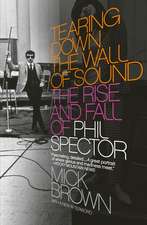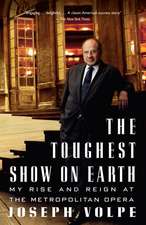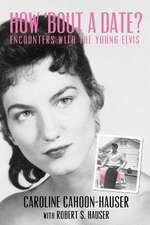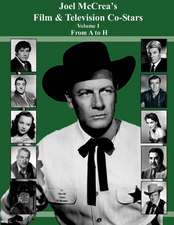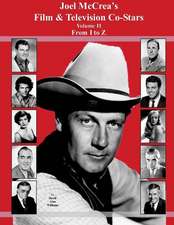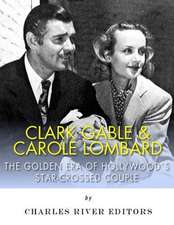Stepin Fetchit: The Life and Times of Lincoln Perry
Autor Mel Watkinsen Limba Engleză Paperback – 31 oct 2006
Preț: 111.42 lei
Nou
Puncte Express: 167
Preț estimativ în valută:
21.32€ • 22.26$ • 17.65£
21.32€ • 22.26$ • 17.65£
Carte disponibilă
Livrare economică 15-29 martie
Preluare comenzi: 021 569.72.76
Specificații
ISBN-13: 9781400096763
ISBN-10: 1400096766
Pagini: 338
Ilustrații: 8 PP. B&W
Dimensiuni: 128 x 206 x 19 mm
Greutate: 0.34 kg
Editura: Vintage Books USA
ISBN-10: 1400096766
Pagini: 338
Ilustrații: 8 PP. B&W
Dimensiuni: 128 x 206 x 19 mm
Greutate: 0.34 kg
Editura: Vintage Books USA
Notă biografică
Mel Watkins, a former editor and writer for The New York Times Book Review, is the author of Dancing with Strangers, a Literary Guild Selection, and of the highly acclaimed On the Real Side: A History of African American Comedy. He lives in New York City.
Extras
In the late 1800s, Key West, Florida, still bore a faint resemblance to the barren wilderness described in settlers' colorful tales about the island's fierce Calusa Indians or the marauding pirates who had kept the eighteenth-century French and Spanish pioneers at bay for decades. The four-mile-long sand and coral island had officially become part of the United States in 1826. Only ninety miles from Havana, Cuba, it was the southernmost settlement in the continental United States and still had the untamed aura of a frontier outpost. By 1860, as the nation moved inevitably toward the Civil War, it had become the wealthiest city per capita in America despite not having a rail link to the Florida mainland. At the time, its economy relied on shipbuilding, sponging, cigar packing, and the harvesting of snail, shrimp, lobster, and stone crab.
The island's prosperity was fleeting, however. Still, the mid-nineteenth-century boom along with the island's natural beauty and reputation as an exotic getaway made it a haven and magnet for adventurers, artists, eccentrics, and tourists, as well as for a growing number of West Indians for whom it was a doorway to the United States. Among the latter group were Joseph H. Perry, a skilled Jamaican cigar wrapper, cook, and would-be entertainer, and Dora Monroe, a Bahamian seamstress who grew up in Nassau. They were married in 1898 and, leaving Nassau, arrived in Key West in 1902.
In addition to being something of a womanizer and traveling man, Joseph Perry was, by many accounts, a fair hoofer, singer, and an aspiring minstrel stage performer. He was a gregarious, cocky man who took great pride in his Caribbean background and his status as a subject of the British Crown--a fact of which he regularly boasted, particularly when dealing with African Americans.
Joseph and Dora had three children. Their second child, Lincoln, would go on to far surpass his father's wildest aspirations.
Lincoln Perry was born on May 30, 1902, in Key West. He later claimed that his father named him for four presidents; his full name was Lincoln Theodore Monroe Andrew Perry. According to one account, "he was born as an American by a few hours only," since his parents arrived in the Keys just prior to his birth. His older sister, Lucille, had been born two years earlier, and his younger sister, Mary, who later changed her name to Marie, was born a year and a half later. Lincoln and his siblings rarely discussed their childhood or family life publicly, and since no personal letters or firsthand accounts related to that period have been found, the actor's early years in Key West and his adolescent years in Tampa after the family moved to the mainland are shrouded in mystery.
Apparently, Lincoln Perry did not suffer from a lack of confidence. Like many other Caribbean immigrants, the Perry family reportedly displayed an assertiveness that, at the time, was most often held in check by former African American slaves and their descendants. Years after he reigned as a Hollywood star, Perry suggested that his youthful self-esteem was derived from his Caribbean background.
"I'm a descendant of the West Indies," Perry told a reporter. "I had talent all my life." Far from being "lazy and stupid . . . the white man's fool" that many made him out to be, he insisted that he was "the first Negro militant."
It was a defense of his by-then-tainted reputation and an affirmation of pride in his West Indian heritage. Perry's attitude reflected a culturally based rift between American-born and Caribbean-born blacks that in the early twentieth century frequently sparked heated clashes.
Despite the mumbling, ostensibly cowering screen character that he later immortalized as Stepin Fetchit, Lincoln Perry displayed his aggressive racial and cultural pride in offscreen relationships with both whites and blacks throughout his career.
Ironically, when his double-talk and roundabout public statements are scrutinized, when his extravagant spending, cavalier lifestyle and frequent clashes with the producers and moguls who controlled the Hollywood studio system are put into context, Perry surfaces in sharp contrast to the image inspired by previous knee-jerk assumptions. Uneducated, but shrewdly intelligent, he parlayed his considerable talent and folk wit (the equivalent of today's street smarts) into screen stardom during a period of blatant racial oppression and intolerance that make conditions in the twenty-first-century "hood" look like a model of racial harmony and equality.
He was far deeper and much more volatile and complicated than the portrait of a shallow, ingratiating buffoon drawn by many historians and critics. Pronouncements of religious fervor aside, he was no choirboy. Hot-tempered, prone to violent outbursts, egotistical, and, at heart, a bit of a scoundrel--he was as confounding as any black star who took to the stage and screen in the twentieth century. But when the character he created on stage and in pictures is considered as a carefully molded caricature that burlesqued mainstream America's contemptuous vision of Negroes, Perry also emerges as a cagey self-publicist and brilliant comic actor. Perhaps most surprisingly, when his on-set hassles with studio executives are viewed in the context of the era's twisted racial arrangements and his pioneer achievements in the film industry are weighed objectively, he rears as a prideful, race-conscious agitator for equal treatment in the entertainment field. He was, and still is, largely misunderstood. If not quite the "militant" that he sometimes claimed, he was a sly provocateur. "I didn't fight my way in," he once said, "I eased in." At the time, it was realistically the only way of bucking the system.
Pride and Caribbean heritage aside, the racial tenor of early-twentieth-century America dictated that Perry and his family exercise some caution around white Americans. Like many American Negroes, they often resorted to a bit of subterfuge and trickery developed in Southern slave quarters as well as the West Indies--a survival tactic that would be sustained long after slaves were freed. It was perhaps best described by the old saw "Got one mind for white folks to see; 'nother for what I know is me." The tactic found its most frequent expression in what slaves had called "puttin' on ole massa." Lincoln Perry was an expert at it.
At the peak of his Hollywood stardom--when nearly every black shoeshine boy in America began copying his lazy drawl and slow, shambling gait, and motion-picture-cartoon representations of Negroes were invariably modeled on the character he created--Lincoln Perry doggedly adhered to that bit of black folk wisdom. He misled interviewers with fanciful anecdotes about his past, distorting and reshaping facts regarding his childhood as well as other aspects of his personal life in nearly all comments to the press, and, until his last years, generally bedeviled any attempt to expose the real person behind his carefully concocted public persona. For Perry the ruse was also an expression of the waggish delight he took in mocking America's middle-class mores by confounding and often outfoxing assumedly "superior" adversaries.
The rambling, circuitous accounts of his past with which he regaled reporters were often calculated misdirections, reflecting a roguish temperament and sly, double-edged wit that, despite his stature as one of America's best-known comedians, most observers were reluctant to concede he possessed. Throughout his life, Lincoln Perry remained an enigmatic, chameleonlike, conflicted figure--an entertainer whose name and reputation would assume mythic proportions, while the man behind the myth remained as illusive as a shadow. Even today, while most are familiar with the name Stepin Fetchit and may even have used it in a derogatory manner, very few have ever actually seen the actor perform onstage or in motion pictures. (Scenes in which he appeared have been deleted from most of the few movies available on tape or shown on television.)
What generally surfaced in the media was the specter of a self-indulgent profligate and malcontent whose antic conduct--much like the often outrageous stunts of latter-day comics and Bad Boys Richard Pryor and Martin Lawrence--seemed driven by some self-destructive, deep-seated internal demon. The assessment was in part correct. In addition, however, like Madonna, Howard Stern, Britney Spears, J. Lo, Paris Hilton, and many other present-day celebrities, he realized that even bad press sells--that notoriety can and often does confer power.
There is little doubt that at an early age Perry was a cutup and prankster. "Ah was terrible bright, but Ah never studied," he once told a reporter, insisting (as he commonly did with the mainstream press) that his remarks be rendered in stilted stage dialect. "Ah was a bad example. Ah was a thug, allus stealin'." Even his self-dubbed childhood nickname, "Slop Jar," suggests that early on he had an outsider's irreverent, somewhat satirical view of both himself and his life circumstances.
Still, he developed a keen interest in religion at an early age, which lead a childhood friend to insist that "Step was always a church fanatic." It was Dora Perry who initially fired that religious fervor. Unlike her husband, she was a pious woman and a devout Catholic who reportedly insisted that her children attend church regularly. Lincoln adored his mother and seems to have followed her instructions or given the appearance of doing so without much complaint. Long after her death, Lincoln's connection to the church remained one of the most stable elements in his life.
Dora Perry apparently exerted tremendous influence over her son, but outside of her religious convictions she remains a vague figure. The paternal side of Lincoln's background, however, is a little less shadowy. He spoke glowingly of his father on the few occasions that he talked about his childhood and seemed to have been genuinely impressed by the elder Perry's talent as well as his itinerant lifestyle, which contrasted sharply with the religious and family values esteemed by Lincoln's mother.
A free spirit and sportin' man, Joseph Perry often took to the road. Leaving the tedium of family life and his cigar-wrapping job behind, he frequently journeyed to Miami and the surrounding areas to search for more invigorating work as an entertainer. Later, he moved his family to the Tampa area, where the Rabbit Foot Company, a famed black minstrel troupe, was based. Despite the distress his jaunts may have caused his wife or the burden and hardship they may have placed on the family, he was idolized by his son. From an early age, young Lincoln displayed an urge to follow in his father's footsteps.
"His mother wanted him to be a dentist," Joseph Perry told a Los Angeles Times reporter during a rare interview in 1929. "She sewed for the wife of a dentist and tried to have the boy work as an errand boy for the dentist and absorb the idea of some day becoming a dentist himself, but he would have none of it. And his mother was heartbroken.
"My boy was always tapping his feet. He would sit down to eat a meal and under the table his feet would always go tap, tap, tap.
"His mother threatened him many times and ordered him to stop. But I always told mammy, 'You hush up and let him tap, because that tapping is going to get him somewhere some day.'"
Although there is no evidence that young Lincoln Perry spent much time fretting over it, the disparity between the lifestyles and values extolled by his mother and those of his father was extreme. Throughout his life, Lincoln Perry seems to have displayed an exceptional ability to accept and, in his own life, effortlessly embrace behavior that most others considered conflicting or contrary. He apparently admired and was drawn to both his father's love for show business and the secular life, and his mother's piety and regard for middle-class respectability. This despite the fact that at the turn of the twentieth century many pious Americans scornfully viewed the entertainment profession as Satan's domain. Among the Negro middle class, scorn was even greater if the entertainers happened to be minstrel performers. Just as many churchgoing blacks vigorously denounced the blues as the devil's music, the Negro elite typically condemned minstrelsy's ethnic comedy as reprehensible and distorted--a detriment to racial progress.
The minstrel show craze that had swept mainstream America in the mid-nineteenth century was waning by the 1900s, but it had left its mark on the face of black entertainment. With few exceptions, the entertainers who worked the traveling medicine shows, carnivals, tent shows, and circuses in the early twentieth century not only reprised much of the material introduced by white minstrel performers but also "corked up" and appeared in blackface.
According to some historians, minstrelsy's traditional semicircular format, which featured a staid moderator and comic end men, Tambo and Bones, who clowned and bantered with him, was created around 1840 by the John Luca troupe, a family of black traveling performers. But it was Dan Emmett and a group of white entertainers billing themselves as the Virginia Minstrels who formalized the presentation and brought it to the New York City stage in February 1843. Performed by white men in garish blackface makeup, the three-act minstrel show quickly became the nation's most popular form of entertainment.
Only a few black performers broke the color line before the Civil War. William Henry "Juba" Lane, who joined the Ethiopian Serenaders in the 1840s and toured Europe and the United States with the formerly all-white company, was among the first and most popular. The success and acceptance of pioneers like Lane, who was later touted as the father of modern tap dance, set the stage for other black performers, and just prior to the Civil War, a few all-black minstrel troupes began surfacing.
America's first professional black musicians and entertainers, many the sons and daughters of former slaves, cut their teeth on the minstrel stage. Although they were spurned by most respectable colored folk and their performances condemned by some black critics, black minstrelsy soon established itself as the cornerstone of African American performing arts.
Early blackface stars included Billy Kersands, the reputed originator of such popular dances as the Virginia Essence and the Buck and Wing; Ernest Hogan, whose popularity soared with release of the song "All Coons Look Alike to Me" in 1896; James Bland, the performer and composer who wrote Virginia's state song, "Carry Me Back to Old Virginny"; and the comedy team of Bert Williams and George Walker.
Joseph Perry probably watched and patterned his own act after those charismatic entertainers. Talking to his son at home or, when the boy was old enough to accompany him, taking him along on an excursion to watch or perform in one of the tent shows or carnivals that passed through the Tampa area, the elder Perry would have certainly eagerly praised the accomplishments of those pioneers.
Kersands, Hogan, and Bert Williams had altered and subtly humanized the Negro stage characters (originally known as Sambo and Zip Coon) popularized by white minstrel performers. But their updated versions (the shiftless rural rube and bombastic, dandified city slicker), still had firm roots in a mainstream stage tradition that openly satirized the behavior of America's former slaves.
From the Hardcover edition.
The island's prosperity was fleeting, however. Still, the mid-nineteenth-century boom along with the island's natural beauty and reputation as an exotic getaway made it a haven and magnet for adventurers, artists, eccentrics, and tourists, as well as for a growing number of West Indians for whom it was a doorway to the United States. Among the latter group were Joseph H. Perry, a skilled Jamaican cigar wrapper, cook, and would-be entertainer, and Dora Monroe, a Bahamian seamstress who grew up in Nassau. They were married in 1898 and, leaving Nassau, arrived in Key West in 1902.
In addition to being something of a womanizer and traveling man, Joseph Perry was, by many accounts, a fair hoofer, singer, and an aspiring minstrel stage performer. He was a gregarious, cocky man who took great pride in his Caribbean background and his status as a subject of the British Crown--a fact of which he regularly boasted, particularly when dealing with African Americans.
Joseph and Dora had three children. Their second child, Lincoln, would go on to far surpass his father's wildest aspirations.
Lincoln Perry was born on May 30, 1902, in Key West. He later claimed that his father named him for four presidents; his full name was Lincoln Theodore Monroe Andrew Perry. According to one account, "he was born as an American by a few hours only," since his parents arrived in the Keys just prior to his birth. His older sister, Lucille, had been born two years earlier, and his younger sister, Mary, who later changed her name to Marie, was born a year and a half later. Lincoln and his siblings rarely discussed their childhood or family life publicly, and since no personal letters or firsthand accounts related to that period have been found, the actor's early years in Key West and his adolescent years in Tampa after the family moved to the mainland are shrouded in mystery.
Apparently, Lincoln Perry did not suffer from a lack of confidence. Like many other Caribbean immigrants, the Perry family reportedly displayed an assertiveness that, at the time, was most often held in check by former African American slaves and their descendants. Years after he reigned as a Hollywood star, Perry suggested that his youthful self-esteem was derived from his Caribbean background.
"I'm a descendant of the West Indies," Perry told a reporter. "I had talent all my life." Far from being "lazy and stupid . . . the white man's fool" that many made him out to be, he insisted that he was "the first Negro militant."
It was a defense of his by-then-tainted reputation and an affirmation of pride in his West Indian heritage. Perry's attitude reflected a culturally based rift between American-born and Caribbean-born blacks that in the early twentieth century frequently sparked heated clashes.
Despite the mumbling, ostensibly cowering screen character that he later immortalized as Stepin Fetchit, Lincoln Perry displayed his aggressive racial and cultural pride in offscreen relationships with both whites and blacks throughout his career.
Ironically, when his double-talk and roundabout public statements are scrutinized, when his extravagant spending, cavalier lifestyle and frequent clashes with the producers and moguls who controlled the Hollywood studio system are put into context, Perry surfaces in sharp contrast to the image inspired by previous knee-jerk assumptions. Uneducated, but shrewdly intelligent, he parlayed his considerable talent and folk wit (the equivalent of today's street smarts) into screen stardom during a period of blatant racial oppression and intolerance that make conditions in the twenty-first-century "hood" look like a model of racial harmony and equality.
He was far deeper and much more volatile and complicated than the portrait of a shallow, ingratiating buffoon drawn by many historians and critics. Pronouncements of religious fervor aside, he was no choirboy. Hot-tempered, prone to violent outbursts, egotistical, and, at heart, a bit of a scoundrel--he was as confounding as any black star who took to the stage and screen in the twentieth century. But when the character he created on stage and in pictures is considered as a carefully molded caricature that burlesqued mainstream America's contemptuous vision of Negroes, Perry also emerges as a cagey self-publicist and brilliant comic actor. Perhaps most surprisingly, when his on-set hassles with studio executives are viewed in the context of the era's twisted racial arrangements and his pioneer achievements in the film industry are weighed objectively, he rears as a prideful, race-conscious agitator for equal treatment in the entertainment field. He was, and still is, largely misunderstood. If not quite the "militant" that he sometimes claimed, he was a sly provocateur. "I didn't fight my way in," he once said, "I eased in." At the time, it was realistically the only way of bucking the system.
Pride and Caribbean heritage aside, the racial tenor of early-twentieth-century America dictated that Perry and his family exercise some caution around white Americans. Like many American Negroes, they often resorted to a bit of subterfuge and trickery developed in Southern slave quarters as well as the West Indies--a survival tactic that would be sustained long after slaves were freed. It was perhaps best described by the old saw "Got one mind for white folks to see; 'nother for what I know is me." The tactic found its most frequent expression in what slaves had called "puttin' on ole massa." Lincoln Perry was an expert at it.
At the peak of his Hollywood stardom--when nearly every black shoeshine boy in America began copying his lazy drawl and slow, shambling gait, and motion-picture-cartoon representations of Negroes were invariably modeled on the character he created--Lincoln Perry doggedly adhered to that bit of black folk wisdom. He misled interviewers with fanciful anecdotes about his past, distorting and reshaping facts regarding his childhood as well as other aspects of his personal life in nearly all comments to the press, and, until his last years, generally bedeviled any attempt to expose the real person behind his carefully concocted public persona. For Perry the ruse was also an expression of the waggish delight he took in mocking America's middle-class mores by confounding and often outfoxing assumedly "superior" adversaries.
The rambling, circuitous accounts of his past with which he regaled reporters were often calculated misdirections, reflecting a roguish temperament and sly, double-edged wit that, despite his stature as one of America's best-known comedians, most observers were reluctant to concede he possessed. Throughout his life, Lincoln Perry remained an enigmatic, chameleonlike, conflicted figure--an entertainer whose name and reputation would assume mythic proportions, while the man behind the myth remained as illusive as a shadow. Even today, while most are familiar with the name Stepin Fetchit and may even have used it in a derogatory manner, very few have ever actually seen the actor perform onstage or in motion pictures. (Scenes in which he appeared have been deleted from most of the few movies available on tape or shown on television.)
What generally surfaced in the media was the specter of a self-indulgent profligate and malcontent whose antic conduct--much like the often outrageous stunts of latter-day comics and Bad Boys Richard Pryor and Martin Lawrence--seemed driven by some self-destructive, deep-seated internal demon. The assessment was in part correct. In addition, however, like Madonna, Howard Stern, Britney Spears, J. Lo, Paris Hilton, and many other present-day celebrities, he realized that even bad press sells--that notoriety can and often does confer power.
There is little doubt that at an early age Perry was a cutup and prankster. "Ah was terrible bright, but Ah never studied," he once told a reporter, insisting (as he commonly did with the mainstream press) that his remarks be rendered in stilted stage dialect. "Ah was a bad example. Ah was a thug, allus stealin'." Even his self-dubbed childhood nickname, "Slop Jar," suggests that early on he had an outsider's irreverent, somewhat satirical view of both himself and his life circumstances.
Still, he developed a keen interest in religion at an early age, which lead a childhood friend to insist that "Step was always a church fanatic." It was Dora Perry who initially fired that religious fervor. Unlike her husband, she was a pious woman and a devout Catholic who reportedly insisted that her children attend church regularly. Lincoln adored his mother and seems to have followed her instructions or given the appearance of doing so without much complaint. Long after her death, Lincoln's connection to the church remained one of the most stable elements in his life.
Dora Perry apparently exerted tremendous influence over her son, but outside of her religious convictions she remains a vague figure. The paternal side of Lincoln's background, however, is a little less shadowy. He spoke glowingly of his father on the few occasions that he talked about his childhood and seemed to have been genuinely impressed by the elder Perry's talent as well as his itinerant lifestyle, which contrasted sharply with the religious and family values esteemed by Lincoln's mother.
A free spirit and sportin' man, Joseph Perry often took to the road. Leaving the tedium of family life and his cigar-wrapping job behind, he frequently journeyed to Miami and the surrounding areas to search for more invigorating work as an entertainer. Later, he moved his family to the Tampa area, where the Rabbit Foot Company, a famed black minstrel troupe, was based. Despite the distress his jaunts may have caused his wife or the burden and hardship they may have placed on the family, he was idolized by his son. From an early age, young Lincoln displayed an urge to follow in his father's footsteps.
"His mother wanted him to be a dentist," Joseph Perry told a Los Angeles Times reporter during a rare interview in 1929. "She sewed for the wife of a dentist and tried to have the boy work as an errand boy for the dentist and absorb the idea of some day becoming a dentist himself, but he would have none of it. And his mother was heartbroken.
"My boy was always tapping his feet. He would sit down to eat a meal and under the table his feet would always go tap, tap, tap.
"His mother threatened him many times and ordered him to stop. But I always told mammy, 'You hush up and let him tap, because that tapping is going to get him somewhere some day.'"
Although there is no evidence that young Lincoln Perry spent much time fretting over it, the disparity between the lifestyles and values extolled by his mother and those of his father was extreme. Throughout his life, Lincoln Perry seems to have displayed an exceptional ability to accept and, in his own life, effortlessly embrace behavior that most others considered conflicting or contrary. He apparently admired and was drawn to both his father's love for show business and the secular life, and his mother's piety and regard for middle-class respectability. This despite the fact that at the turn of the twentieth century many pious Americans scornfully viewed the entertainment profession as Satan's domain. Among the Negro middle class, scorn was even greater if the entertainers happened to be minstrel performers. Just as many churchgoing blacks vigorously denounced the blues as the devil's music, the Negro elite typically condemned minstrelsy's ethnic comedy as reprehensible and distorted--a detriment to racial progress.
The minstrel show craze that had swept mainstream America in the mid-nineteenth century was waning by the 1900s, but it had left its mark on the face of black entertainment. With few exceptions, the entertainers who worked the traveling medicine shows, carnivals, tent shows, and circuses in the early twentieth century not only reprised much of the material introduced by white minstrel performers but also "corked up" and appeared in blackface.
According to some historians, minstrelsy's traditional semicircular format, which featured a staid moderator and comic end men, Tambo and Bones, who clowned and bantered with him, was created around 1840 by the John Luca troupe, a family of black traveling performers. But it was Dan Emmett and a group of white entertainers billing themselves as the Virginia Minstrels who formalized the presentation and brought it to the New York City stage in February 1843. Performed by white men in garish blackface makeup, the three-act minstrel show quickly became the nation's most popular form of entertainment.
Only a few black performers broke the color line before the Civil War. William Henry "Juba" Lane, who joined the Ethiopian Serenaders in the 1840s and toured Europe and the United States with the formerly all-white company, was among the first and most popular. The success and acceptance of pioneers like Lane, who was later touted as the father of modern tap dance, set the stage for other black performers, and just prior to the Civil War, a few all-black minstrel troupes began surfacing.
America's first professional black musicians and entertainers, many the sons and daughters of former slaves, cut their teeth on the minstrel stage. Although they were spurned by most respectable colored folk and their performances condemned by some black critics, black minstrelsy soon established itself as the cornerstone of African American performing arts.
Early blackface stars included Billy Kersands, the reputed originator of such popular dances as the Virginia Essence and the Buck and Wing; Ernest Hogan, whose popularity soared with release of the song "All Coons Look Alike to Me" in 1896; James Bland, the performer and composer who wrote Virginia's state song, "Carry Me Back to Old Virginny"; and the comedy team of Bert Williams and George Walker.
Joseph Perry probably watched and patterned his own act after those charismatic entertainers. Talking to his son at home or, when the boy was old enough to accompany him, taking him along on an excursion to watch or perform in one of the tent shows or carnivals that passed through the Tampa area, the elder Perry would have certainly eagerly praised the accomplishments of those pioneers.
Kersands, Hogan, and Bert Williams had altered and subtly humanized the Negro stage characters (originally known as Sambo and Zip Coon) popularized by white minstrel performers. But their updated versions (the shiftless rural rube and bombastic, dandified city slicker), still had firm roots in a mainstream stage tradition that openly satirized the behavior of America's former slaves.
From the Hardcover edition.
Recenzii
"Beautifully evokes the 'times' of Stepin Fetchit, providing a surprisingly fresh look at the complex history of blackness and the silver screen." –Entertainment Weekly
“Commendable . . . thorough and authoritative.”–The New York Times
"Enthralling. . . .Watkins goes back . . . to the vaudeville road, the black-theater circuit, the tent shows, dance clubs, burlesque houses, carnivals, cabarets, race riots and lynch mobs. Stepin Fetchit is a shadow history of performance as survival." –Harper's
"Fascinating. . . . An engrossing study of Perry." –Essence
“Commendable . . . thorough and authoritative.”–The New York Times
"Enthralling. . . .Watkins goes back . . . to the vaudeville road, the black-theater circuit, the tent shows, dance clubs, burlesque houses, carnivals, cabarets, race riots and lynch mobs. Stepin Fetchit is a shadow history of performance as survival." –Harper's
"Fascinating. . . . An engrossing study of Perry." –Essence
Descriere
Watkins' meticulously researched and sensitive biography reveals the paradoxes of this pioneering actor's life, from Perry's tremendous popularity to his money troubles and rowdy offscreen antics.
